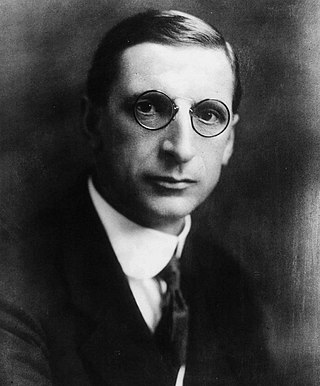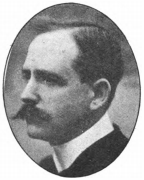
The 1918 Irish general election was the part of the 1918 United Kingdom general election which took place in Ireland. It is a key moment in modern Irish history because it saw the overwhelming defeat of the moderate nationalist Irish Parliamentary Party (IPP), which had dominated the Irish political landscape since the 1880s, and a landslide victory for the radical Sinn Féin party. Sinn Féin had never previously stood in a general election, but had won six seats in by-elections in 1917–18. The party had vowed in its manifesto to establish an independent Irish Republic. In Ulster, however, the Unionist Party was the most successful party.

The Conservative Party of Canada has gone by a variety of names over the years since Canadian Confederation. Initially known as the "Liberal-Conservative Party", it dropped "Liberal" from its name in 1873, although many of its candidates continued to use this name.

The 1918 United Kingdom general election was called immediately after the Armistice with Germany which ended the First World War, and was held on Saturday, 14 December 1918. The governing coalition, under Prime Minister David Lloyd George, sent letters of endorsement to candidates who supported the coalition government. These were nicknamed "Coalition Coupons", and led to the election being known as the "coupon election". The result was a massive landslide in favour of the coalition, comprising primarily of the Conservatives and Coalition Liberals, with massive losses for Liberals who were not endorsed. Nearly all the Liberal MPs without coupons were defeated, including party leader H. H. Asquith.
The Unionist Party was a centre-right political party in Canada, composed primarily of former members of the Conservative party with some individual Liberal Members of Parliament. It was formed in 1917 by MPs who supported the "Union government" formed by Sir Robert Borden during the First World War, who formed the government through the final years of the war, and was a proponent of conscription. It was opposed by the remaining Liberal MPs, who sat as the official opposition.

The 1917 Canadian federal election was held on December 17, 1917, to elect members of the House of Commons of Canada of the 13th Parliament of Canada. Described by historian Michael Bliss as the "most bitter election in Canadian history", it was fought mainly over the issue of conscription. The election resulted in Prime Minister Sir Robert Borden's Unionist government elected with a strong majority and the largest percentage of the popular vote for any party in Canadian history.

The 1917 Alberta general election was held on 7 June 1917 to elect members of the Legislative Assembly of Alberta. The Liberals won a fourth term in office, defeating the Conservative Party of Edward Michener.

Henry Page Croft, 1st Baron Croft was a decorated British soldier and Conservative Party politician.
Parliamentary by-elections in the United Kingdom occur when a Member of Parliament (MP) vacates a House of Commons seat during the course of a parliament.
The 1933 Kilmarnock by-election was a by-election held on 2 November 1933 for the House of Commons constituency of Kilmarnock in Ayrshire.

The Military Voters Act was a 1917 Act of the Parliament of Canada. The legislation was passed in 1917 during World War I, giving the right to vote to all Canadian soldiers. The act was significant for swinging the newly enlarged military vote in the Union Party's favour, and in that it gave a large number of Canadian women the right to vote for the first time.

James Andrew Seddon CH was a British trades unionist and politician. Originally a member of the Labour Party, he subsequently moved to the National Democratic and Labour Party.

David Marshall Mason was a Scottish Liberal politician, banker and businessman.
Alfred Ernest Newbould was a British cinematographer and Liberal politician.

Sir William Ryland Dent Adkins was an English barrister, judge and Liberal politician.
The 1919 St Albans by-election was a parliamentary by-election held in England in December 1919 for the House of Commons constituency of St Albans in Hertfordshire.
Alfred Roger JephcottJP was a British engineer, trade unionist and Conservative Party politician from Birmingham. He sat in the House of Commons from 1918 to 1929.
The 1919 Manchester Rusholme by-election was a parliamentary by-election held in October 1919 for the British House of Commons constituency of Manchester Rusholme. The by-election was important for shaping the future Labour Party attitude to electoral relations with the Liberal Party.
The 1917 Islington East by-election was a parliamentary by-election for the British House of Commons constituency of Islington East held on 23 October 1917.
The 1917 Aberdeen South by-election was a parliamentary by-election for the House of Commons constituency of Aberdeen South comprising the local government wards in the southern part of the city of Aberdeen. The by-election took place on 3 April 1917.
The Hyde by-election was a Parliamentary by-election. It returned one Member of Parliament (MP) to the House of Commons of the United Kingdom, elected by the first past the post voting system. The by-election was held on 30 March 1916.









